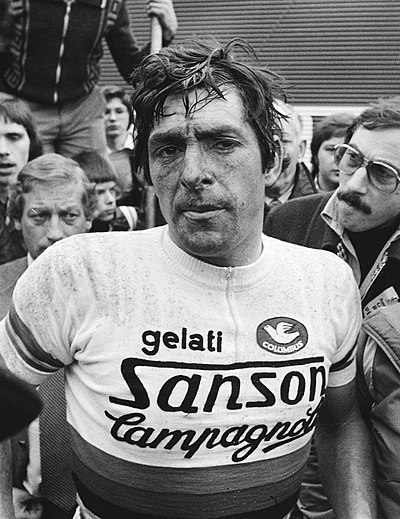
Search
Francesco Moser

Francesco Moser (Italian: [franˈtʃesko ˈmɔːzer, - moˈzɛr], German: [ˈmoːzɐ]; born 19 June 1951), nicknamed "Lo sceriffo" (The sheriff), is an Italian former professional road bicycle racer. He finished on the podium of the Giro d'Italia six times including his win in the 1984 edition.
Moser was dominant from the mid-1970s to the early 1980s. He turned professional in 1973, showing a cultured pedaling style. But his powerful build meant he was not a gifted climber. He entered one edition of the Tour de France, in 1975, where he won two stages, held the maillot jaune for six days and finished 7th overall. He also won the 1977 world road racing championship in addition to collecting silver medals in 1976 and 1978. He won six times in three of the five monuments. Three consecutive editions of Paris–Roubaix, two victories in the Giro di Lombardia and one win in Milan–San Remo.
His 273 road victories puts him behind Eddy Merckx (525) and Rik Van Looy (379), but ahead of Rik Van Steenbergen (270) and Roger De Vlaeminck (255). He was also an accomplished track rider, riding up to six Six-Day races almost each winter throughout his career. He rode 35, 14 of which with René Pijnen, winning 15.
A nephew, Moreno Moser, (born 25 December 1990) is an Italian professional racer, and Francesco's son Ignazio Moser enjoyed success at the junior and amateur levels before retiring at the age of 22.
Palmarès
Classic races
After finishing second in 1974 behind Roger De Vlaeminck and in 1976 behind Marc Demeyer of Belgium, Moser finally won Paris–Roubaix, his favorite race, three consecutive times. Moser had seven podium finishes in Paris–Roubaix; only De Vlaeminck, with nine, has more. In 1978, he beat De Vlaeminck and Jan Raas of the Netherlands; in 1979, he beat De Vlaeminck and Hennie Kuiper of the Netherlands; and in 1980, he beat Gilbert Duclos-Lassalle of France and the German, Dietrich Thurau. Moser came in third in 1981 behind Bernard Hinault and Roger De Vlaeminck, and was also third in 1983 behind Hennie Kuiper and Gilbert Duclos-Lassalle. He rode Paris–Roubaix in his final season as a cyclist in 1987. Other victories include the 1975 and 1978 Giro di Lombardia and the 1984 Milan–San Remo.
Other classics
Moser won the 1974 Paris–Tours, the 1977 Züri-Metzgete, the 1979 Gent–Wevelgem, and the 1977 Flèche Wallonne.
Grand Tours
Moser had some success in the three-week grand tours. He rode the Tour de France in 1975, and although he won two stages, led the race for seven days and won the young rider competition, he never rode the Tour again; the mountains did not suit him. However, he won the 1984 Giro d'Italia, in front of Laurent Fignon of France and Moreno Argentin of Italy. Taking advantage of an unusually flat course, Moser made the most of the time-trials and the aerodynamic bike with full disc wheels that he had just broken the hour record using (technology not available to any other rider during the race) to overcome what others had gained in the mountains. However the result of the race has been called into question by various accusations including shortend or redirected mountain stages, inconsistent awarding of penalties and low flying helecopters being behind some riders but in front of others. Subsequently he would go on to win the points classification in the Giro d'Italia in 1976, 1977, 1978 and 1982.
Other accomplishments
He competed in the individual road race and team time trial events at the 1972 Summer Olympics.
Moser won the 1977 world road racing championship in San Cristobal, Venezuela, in front of Thurau and Franco Bitossi. Moser was also silver medallist in 1976, behind Freddy Maertens of Belgium and second in 1978 to Gerrie Knetemann of the Netherlands.
On 19 January 1984, in Mexico City, Moser broke the 1972 hour record of Eddy Merckx. His coach at the time was the now banned for life Michele Ferrari. He rode 50.808 kilometers, on an aerodynamic bike with full disc wheels more advanced than the conventional bike Merckx used in 1972. As a result, in 1997 the Union Cycliste Internationale banned hour records set on bikes featuring technological advantages. Under the new rules, Merckx's record wasn't broken until 2000. Moser auctioned his bicycle to benefit UNICEF.
He was a member of the Regional Council of Trentino-Alto Adige from 1993 until 1998.
Rivalries
Moser's biggest rival was Giuseppe Saronni.
After retirement
Moser started a bike company, Moser Cicli, constructing race bikes in a workshop in Trento. Production is 2,000-3,000 frames annually.
He was the first chairman of the CPA (Cyclistes Professionels Associés), a union for professional riders of TT/I and TT/II league of teams (now UCI WorldTeams and UCI Professional Continental Teams, respectively). He held the position from 1999 until 2007.
Moser also became a viticulturist, cultivating different varieties of grapes. He continued his father's winery with his children Francesca, Carlo and Ignazio on the family estate Maso Villa Warth in Valle di Cembra, on the hills just north of Trento. He is also a passionate hunter and was the host of the television series "A Caccia con Moser" (Hunting with Moser) on Sky Italia's channel Caccia TV.
Major results
General classification results timeline
Classics results timeline
See also
- Walk of Fame of Italian sport
- Hour record
- Italy at the UCI Road World Championships
- List of doping cases in cycling
- List of Giro d'Italia classification winners
- List of Giro d'Italia general classification winners
- List of Grand Tour general classification winners
- Moser Cicli
- Pink jersey statistics
References
External links
- Francesco Moser at Cycling Archives
- Francesco Moser at ProCyclingStats
- Francesco Moser at CycleBase
- Francesco Moser at Olympedia
- Francesco Moser and his latest son Ignazio are among the characters of the cycling film "The Last Kilometer" Archived 18 August 2013 at the Wayback Machine
Text submitted to CC-BY-SA license. Source: Francesco Moser by Wikipedia (Historical)
Articles connexes
- Francesco Conconi
- Ignazio Moser
- 1975 Tour de France
- 1984 Giro d'Italia
- Francesco
- Bernard Hinault
- Giro Next Gen
- Cycling monument
- Tirreno–Adriatico
- Eddy Merckx
- Graeme Obree
- Grand Tour (cycling)
- Young rider classification in the Tour de France
- Paris–Roubaix
- Gis Gelati
- Hour record
- UCI Road World Championships – Men's road race
- Points classification in the Tour de France
- Points classification in the Giro d'Italia
- List of cycling records
Owlapps.net - since 2012 - Les chouettes applications du hibou




